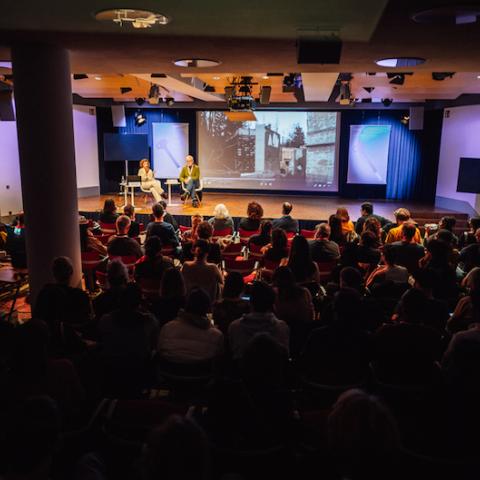
Many of the films at DOK Leipzig this year are dedicated to often-discussed social and political issues that are repeatedly covered by the media. These include the handling of the coronavirus pandemic, rescues at sea in the Mediterranean, the invisibility of domestic violence, cases of sexual abuse in the church, vestiges of the colonial era, diagnoses of ADHD, abortion and the impact of the war in Ukraine.
In its DOK Talks for the general public, the festival addresses overarching themes and deepens the discussion. The DOK Talk “Sensitivity Screening – Unlearning the Past” considers films that reflect the colonial history of various countries, including Germany, and discusses ways of dealing with colonial images and colonial language without resorting to racist stereotypes.
As part of the DOK Industry programme, the panel discussion “Advancing Anti-Racism and Representation in the (Documentary) Film Industry” adds to this focus the question of what means are available to the film industry to further educate itself in critical thinking about racism, to question existing structures and to actively combat racism. Representatives of various organisations and collectives from the field of anti-racism and diversity in the film industry will present their work and share their achievements, failures and lessons learned. They will be joined by Marion Schmidt (ARTEF Steering Committee), Fatih Abay (Diversity and Inclusion Officer at the European Film Academy), Patricia Redzewsky (Diversity, Equity & Inclusion Consultant, member of Schwarze Filmschaffende e.V.) and moderator Seggen Mikael (co-founder of DisCheck).
A further DOK Industry Talk is dedicated to the situation that Belarusian filmmakers are currently facing. The consequences of the Russian war of aggression – for Ukrainians, but also for other countries in central and eastern Europe – are echoed in a number of other films in the programme.
In another public DOK Talk titled “Society, Media, Stereotypes – Who Influences Whom?”, DOK Leipzig will examine various social stereotypes that FLINTA* (female, lesbian, intersex, non-binary, trans and agender persons) in particular are confronted with. The discussion will include ways that stereotypes such as those relating to abortion, sexual abuse, femicide and taboos are influenced by images presented by mass media.
The DOK Talk “animation@DOK Leipzig – Challenge Feature-Length Film” will explore the cinematic form of feature-length animated films. How do the creative and production processes differ from those of animated short films? Animation filmmakers talk about motivation, development, artistic freedom, terms of production, and financing.
Six sets of short films offer further thematic perspectives on the programme. They consist of films that concern themselves with the end of a life (short film reel “Is This the End, My Friend?”) or contemplate all the facets of love and partnership (short film reel “ABC of Love”). Others tell of self-empowerment (short film reel “Shout It Out Loud!”), home and displacement (short film reel “Taking Sites”), venture into the realm of myths and ghosts (short film reel “Ghost Stories”) or note what we can learn from the past (short film reel “Back to the Future”).
Overview of DOK Talks and other events at DOK Leipzig: Events